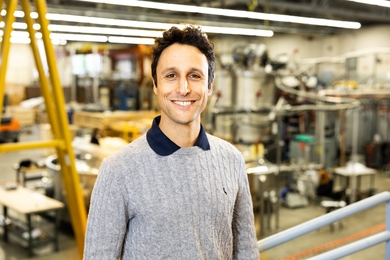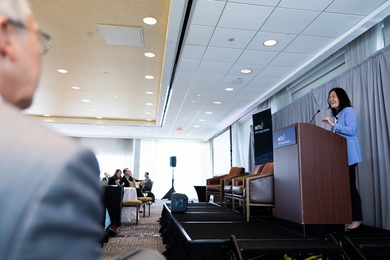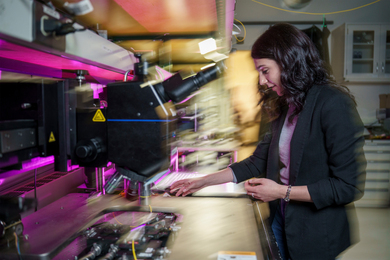In many public discussions of climate change, science takes a back seat to political agendas and rhetoric. But 12.340x (Global Warming Science), a new massive open online course from MITx now open for enrollment on the edX platform, aims to change that dynamic by providing a solid scientific view of what is really happening with global warming.
“We are trying to bring back some of the intellectual excitement that belongs to the field,” says Professor Kerry Emanuel, a co-teacher of the course whose research focuses on hurricanes. “This is a serious science course.”
The MITx course will use many of the lecture materials developed for the on-campus version of the course, along with new videos and visuals. The course will also include new exercises, problem sets, and a final exam, all tailored to the assessment tools available on the edX platform and developed with an eye on preserving the rigor of the course. “You have to have a background in mathematics up through differential equations, and a background in physics,” says Emanuel, the Cecil and Ida Green Professor of Atmospheric Science. “Our intent is that it will be as challenging as the classroom course.”
12.340x will also bring simulations used in the MIT residential course to a wider audience, including the single-column model simulation. Emanuel describes this unique tool as “a computer climate model that takes inputs such as solar radiation and atmospheric greenhouse gas content and calculates the temperatures of the surface and atmosphere, and the moisture and cloud distributions in the atmosphere. Students can change the intensity of sunlight, the time of year, the greenhouse gas concentrations, and other inputs to see how they affect climate change.”
Emanuel expects a wide range of people to take 12.340x. “You’re going to find a lot of students in climate and energy. They will want to know the physics, chemistry, and biology (of climate change).” He also expects professionals working in energy and public policy to be interested in the course. Even a politician has expressed interest in 12.340x, but Emanuel is keeping the individual’s name confidential.
Emanuel and the Department of Earth, Atmospheric and Planetary Sciences also hope to change the dynamic around the study of climate change on the MIT campus. In part because the course is not a requirement, and in part because of the perception among students that climate-change study is mostly about politics and not hard science, the on-campus course has not seen the enrollment levels Emanuel would like to see. “Part of the problem is all the publicity of global warming has sent out a message that global warming is highly politicized, and has nothing to do with science,” he says. “Nothing could be further from the truth.”
“We are trying to bring back some of the intellectual excitement that belongs to the field,” says Professor Kerry Emanuel, a co-teacher of the course whose research focuses on hurricanes. “This is a serious science course.”
The MITx course will use many of the lecture materials developed for the on-campus version of the course, along with new videos and visuals. The course will also include new exercises, problem sets, and a final exam, all tailored to the assessment tools available on the edX platform and developed with an eye on preserving the rigor of the course. “You have to have a background in mathematics up through differential equations, and a background in physics,” says Emanuel, the Cecil and Ida Green Professor of Atmospheric Science. “Our intent is that it will be as challenging as the classroom course.”
12.340x will also bring simulations used in the MIT residential course to a wider audience, including the single-column model simulation. Emanuel describes this unique tool as “a computer climate model that takes inputs such as solar radiation and atmospheric greenhouse gas content and calculates the temperatures of the surface and atmosphere, and the moisture and cloud distributions in the atmosphere. Students can change the intensity of sunlight, the time of year, the greenhouse gas concentrations, and other inputs to see how they affect climate change.”
Emanuel expects a wide range of people to take 12.340x. “You’re going to find a lot of students in climate and energy. They will want to know the physics, chemistry, and biology (of climate change).” He also expects professionals working in energy and public policy to be interested in the course. Even a politician has expressed interest in 12.340x, but Emanuel is keeping the individual’s name confidential.
Emanuel and the Department of Earth, Atmospheric and Planetary Sciences also hope to change the dynamic around the study of climate change on the MIT campus. In part because the course is not a requirement, and in part because of the perception among students that climate-change study is mostly about politics and not hard science, the on-campus course has not seen the enrollment levels Emanuel would like to see. “Part of the problem is all the publicity of global warming has sent out a message that global warming is highly politicized, and has nothing to do with science,” he says. “Nothing could be further from the truth.”






